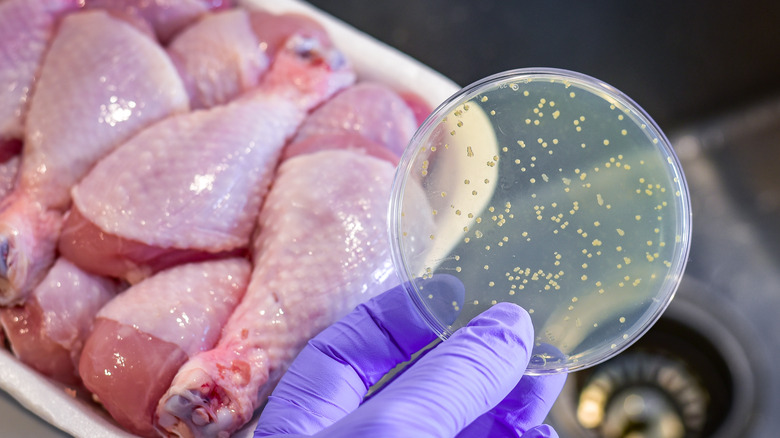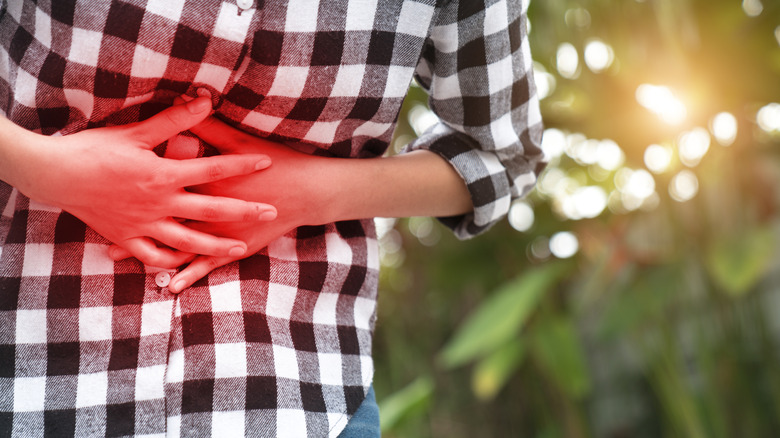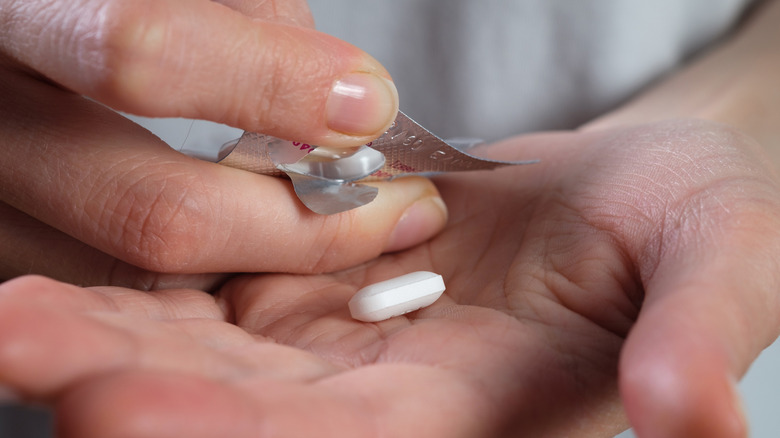How Long It Really Takes For Food Poisoning To Show Itself
Most people have suffered from food poisoning at some point in their lives, in large part because it's tricky to avoid. It may be hard to know what dishes could cause you problems until it's too late, and it's especially hard to steer clear of food poisoning while traveling. When you do get food poisoning, it might not be obvious if it's bacteria or the stomach flu. If you're worried about determining if you're suffering from foodborne disease or an unrelated virus, the timeline isn't super likely to help since food poisoning generally takes between 12 hours and three days to take effect, but it can occasionally wait for eight weeks before striking.
This is a pretty wide range of time, and that's for good reason: There are over 250 types of foodborne illness, so narrowing it down to which one you have is best done by a medical professional. Whether your illness is caused by a parasite, bacteria, toxin, or virus has a lot to do with how long it takes, with toxins being the fastest acting. It's rare, but some food poisoning can turn your stomach within minutes of consuming the tainted dish. However, understanding how food poisoning works may help you figure out how long ago you accidentally infected yourself.
What causes food poisoning
Officially termed foodborne illness, food poisoning comes from eating or working with contaminated food products. Food becomes tainted with bacteria or parasites, and often specific viruses, such as norovirus. On occasion, the food contains some sort of toxin, such as those found in poisonous mushrooms. When you ingest contaminated food, your gut has a reaction that tells your body to expel or fight the foreign irritant. This presents in the form of vomiting and diarrhea, as well as fever, cramps, aches, and gas. When the offending food has been expelled, bacteria and parasites sometimes still remain in the stomach or intestinal lining and can thrive there. In rare cases, the poisoning symptoms can last for weeks, or until a person gets proper treatment.
Food contamination generally happens because of poor cleanliness and safety when handling raw ingredients or completed dishes. Unsafe storage or handling lets germs get into food, and then into your body. The best ways to not give your cookout guests food poisoning are to ensure you use fully cleaned produce, serve meat that's cooked to safe levels, and keep prepared dishes covered in cool areas.
Steps to take if you think you have food poisoning
You may wonder what to do if you suspect a restaurant gave you food poisoning. Unfortunately, there are so many varieties that it all depends on which foodborne illness has laid you low. Salmonella presents in as little as an hour, and doesn't always make you vomit. Watery diarrhea is the first symptom of E. coli, and it can take three days or more before symptom onset. Norovirus also sometimes takes multiple days, and you can get it from people, not just food. Listeria usually presents in a day or two, but it can occasionally take weeks.
While this all sounds scary, the good news is that, most of the time, food poisoning runs its course without medical intervention. At-risk individuals, such as those who are over 65, under 5, pregnant, immunocompromised, or sick with chronic illness, should seek medical aid if they suspect food poisoning. If you're still feeling unwell after a week or can't keep anything down, make an appointment for medical care. Otherwise, remember to rest and drink lots of fluids.
Of course, the best way to deal with food poisoning is to avoid it altogether. Wash your hands well before handling food. Only use clean utensils for prep, and wash your produce thoroughly. If you notice your cooked chicken or pork looks pink inside, there's a potential for Salmonella or parasites. When food has been sitting out at room temperature for hours, it could begin to grow bacteria. If seafood has an acrid, sour smell to it, it's likely gone bad. Basically, if you see signs your takeout could cause food poisoning, it's not worth the risk.


